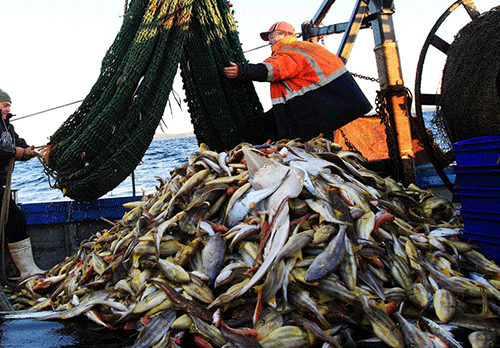State-owned fishing firm, the National Fishing Corporation of Namibia (Fishcor), is unable to pay government outstanding quota fees and levies originating from 2017, 2018, and 2019.
The company’s reputation and the overall industry’s reputation suffered serious harm in recent years with the revelation of malicious transactions that led to the now infamous ‘Fishrot’ scandal.
Responding to allegations from Landless People’s Movement (LPM) leader Bernadus Swartbooi in the National Assembly last week, fisheries deputy minister Sylvia Makgone acknowledged Fishcor’s outstanding amounts, but could not share the exact figures.
“The ministry acknowledges that Fishcor remains indebted to the ministry in unpaid levies and quota fees. Withholding its licensing of vessels will create a chokepoint not just for the employees of Fishcor but will also have serious ramifications for the town’s socio-economic life,” Makgone shared.
Furthermore, she noted the ministry is not planning on writing off the Fishcor debt but will instead devise “friendlier” debt collecting avenues including but not limited to offering Fishcor flexible repayment options.
The deputy minister further informed the August House that fishing companies, including Fishcor, have had difficulties with servicing their financial obligations with financial institutions while at the same time continuing to incur financial expenses due to operational costs. In addition, last month The Namibian reported that Fishcor lacks the resources and knowledge necessary to land the horse mackerel quota it was awarded by government.
According to the article, the parastatal has until 31 December to land 8 000 tonnes of fish before the fishing season ends as there is no carryover of the quota to the next season. As a result, Fishcor roped in a private fishing operator as a solution for the impending deadline.
According to 2022 figures, Namibia’s fishing sector generated over 14% of export revenue and was valued at over N$20 billion. This crucial sector directly employs over 18 000 people and makes up 4.5% of the country’s gross domestic product (GDP).
“These numbers indicate that fishery remains one of the significant contributors to economic growth, employment creation, nutrition, and foreign exchange earnings in Namibia,” shared the fisheries minister Derek Klazen on Monday during a Cabinet briefing session.
The minister added the fishing sector has evolved greatly in terms of ‘Namibianisation’ of fishing rights, employment, value addition, number of fleets, processing plants, investment, regional development, and corporate social responsibility for broader beneficiation. As it stands, at least 95% of all fishing rights holders are Namibians.
Furthermore, Klazen noted that illegal, unreported, and unregulated (IUU) fishing in Namibia’s exclusive economic zone (EEZ) is of serious and increasing concern. The EEZ extends some 200 nautical miles from Namibia’s low water line.
“IUU fishing undermines efforts to conserve and manage fish stock in all capture fisheries. The ministry will continue to strengthen its management and control measures to curb and eliminate IUU fishing through collaboration with the fishing industry and our neighbouring states,” Klazen assured.
He further noted that during the current fiscal year, the ministry carried out nine sea patrol missions and 688 patrols along the coast. It further carried 35 aerial surveillance missions, 39 river patrols and 453 patrols on land along inland waterbodies.
These activities are aimed to deter, curb, and eliminate IUU fishing activities resulting in fines for offenders found to be violating the fishery legislation.
Commenting on Namibia’s blue economy policy, Klazen said the inter-ministerial technical committee on blue economy will be finalising the policy during the current financial year.
“The blue economy policy, once implemented, will enhance effective governance and management systems that sustainably maximises economic benefits from marine resources and ensures equitable marine wealth distribution to all Namibians,” the minister stated.


